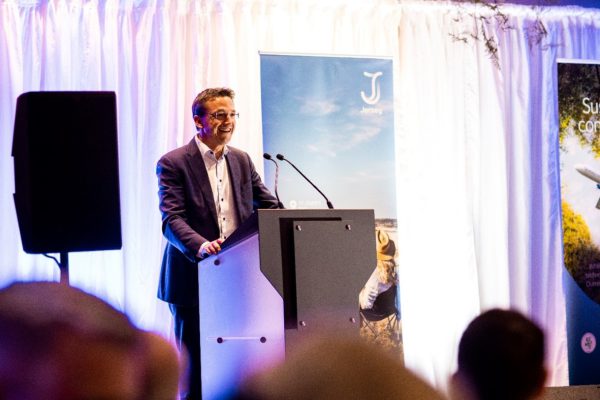This week, Ministers have provided updates to Scrutiny on the progress made against their 2023 Delivery Plans. These plans were made at the end of 2022 and set out a workplan for the year of 39 key priorities, legislation and projects.
I am very proud of the work the Department for the Economy has made against this plan with most of the items now delivered (18) or are on track to be completed shortly (11). In some cases there have been slight delays or a reprioritisation of work and so a further 10 items will be completed in 2024. In the interests of transparency you can read the full list for yourself at the end of this blog but what I want to highlight below is that this work is only the tip of the iceberg.
It does not show the innumerable minor projects, business as usual work or responses to emerging issues that make up so much of the work of Government. So I therefore want to highlight some of the key pieces of work done this year and acknowledge the challenges our economy has faced.
In January, significant flooding across the Island caused the third major incident in the space of a few weeks, following the tragic events in December 2022. The professionalism, speed and care shown by our emergency services and recovery teams as well as our wider community were humbling, and I know the whole Island is grateful for the efforts of everyone involved. There’s been a whole range of associated work that has continued in the background through the year to help those affected by the three incidents. As Deputy Chief Minister, I’ve chaired an oversight group on this recovery effort and have continued to be moved by the care with which all involved have approached this important work.
Another recovery effort has been our work with the dairy sector throughout the year following the death of over 100 cows at Woodlands Farm in December 2023 with support coming from both Government, the industry and from the Howard Davis Farm Trust.
Lots of work has also been underway this year to support the wider rural economy with a revised Rural Support Scheme (RSS) being delivered with a ‘credits’ based approach. This scheme has seen increased funding this year which has enabled a 40% increase in the number of applicants including 8 new start-up businesses.
Next year, will see our support for agriculture rise to £6m which will make a real difference to this sector. Similarly, earlier in 2023 we launched the Island’s first Marine Support scheme and this will also see an uplift in funding in 2024.
I have been meeting regularly with both industries via new stakeholder groups which has allowed for emerging issues to be discussed openly and for some longer-term planning between Government and businesses.
In February, we hosted the Dreaming Trees exhibition at Howard Davis Park. This was a fantastic project that drew 30,000 visitors of all ages and is a great example of adding new events to the quieter months for both islanders and tourists. Other events have been facilitated via the new Creative Island Partnership throughout the year including the first Lunar New Year festival, the Corn Riots festival, Ukraine Day Celebrations, visit by the Antigua and Barbuda Youth Symphony Orchestra and the Floating Earth installation by ArtHouse Jersey.

I’m also pleased that Jersey Heritage has this year launched a year-round opening for their heritage sites. This will be further enhanced in 2024 when the completion of renovations at the Jersey Museum is set to coincide with a trial period of free entry at the museum for the remainder of the year.
On the subject of renovations, refurbishments at Elizabeth Castle have been progressing well and we have recently appointed the main contractor to complete the Jersey Opera House renovations with the completion date still on track for December 2024.
As well as physical infrastructure, the Economy Department has also been working to safeguard our Island’s telecoms infrastructure with progress on the Telecoms Security Framework and the team at the Jersey Cyber Security Centre (JCSC) has been working throughout the year to keep us safe.
Cyber attacks are sometimes perceived as abstract or remote from the public’s consciousness but the reality is that cyber attacks rank amongst the top risks for governments. Financial services in particular are typically subject to three times the average number of cyber attacks compared to other industries and this year the team at the JCSC have worked to resolve ransomware in schools, compromised email servers in hotels, financial thefts and even romance fraud. We’ve also held the first pan-Island Cyber Resilience Exercise and made progress on developing a new Cyber Security Law to empower the JCSC as a new arm’s length body.

Meanwhile, my Assistant Minister, Deputy Alex Curtis has led the work on developing a new Digital Economy Strategy which will be launched early next year and with Digital Jersey has launched Impact Jersey, which has mobilised the Technology Accelerator Fund to support exciting projects and solutions in the digital space.
My other Assistant Minister, Depuy Lucy Stephenson has been leading on the Department’s sport policies this year. This has included work to ensure Jersey’s compliance with the UNESCO Convention Against Doping in Sport and the establishment of our national compliance platform. This year has also seen a review of our Island’s delivery of Sport. This review had a very high level of public interest and has brought forward a number of recommendations which Deputy Stephenson will be taking forward in the months ahead.
We’ve also done work to close the gap in support for local performance athletes who struggle to take the next step in developing their careers when compared to peers born in the UK or Europe. Deputy Stephenson has worked closely with clubs, coaches, athletes and their families to develop the Performance Sport Strategy which seeks to ensure that background, family circumstance and geography are not barriers to success.
I’m very pleased that we’ve secured £40-50k of funding next year to recruit a performance manger and improve the standard of training for local coaches (something that will benefit all those who engage in sport) with a further £100-110k to directly help athletes and their families meet the costs of engaging in their sport.
In many ways this year has been a challenging one for our hospitality sector as the long-term impacts of the COVID pandemic continue to affect cashflow, and although visitor numbers have recovered they remain short of 2019 levels amongst some key demographics. Furthermore, the sector has been particularly challenged by high inflation and staff shortages which have also been felt in other industries.
Earlier this year, the Minister for Justice and Home Affairs launched a new 12-month hospitality work permit and a scheme to allow travel for day trippers using French ID Cards. My Department has also been working very closely with hotels and other businesses in the tourism industry to develop a new Visitor Economy Strategy which will be published next week. We know that there is a direct correlation between the success of our tourism offering and the availability of air links, and between the strength of our hospitality sector and the vibrancy of our town centre. As with the Performance Sport Strategy, we’ve secured some for next year to facilitate the digitisation of visitor information and booking experiences, support aimed to stimulate investment in new hotel bed stock and funding for marketing to develop access to new markets. The funding is only modest at this stage but it is hoped that our work next year can provide a foundation to prove concepts, pilot new ideas and provide a base to secure additional funding next year and beyond.
During this year we have also begun work on some of the legislative changes to enable new growth in this sector and I hope to be able to make further announcements next year about changes to the Tourism Law, Liquor Licensing regime and the Government’s approach to events.

In each case, my Department will be working to ensure that regulations are fit for purpose and proportionate to avoid placing unnecessary burdens on businesses. We’ll also be working with other parts of government to deliver against the recommendations of the Barriers to Business Report ensuring that government processes enable rather than frustrate, innovation and growth. This piece of work was undertaken by Jersey Business earlier over the summer and included submissions from more than 400 individuals representing companies from across Jersey’s economy.
The Barriers to Business report was amongst the first major pieces of work emanating from the Future Economy Programme (FEP) following the publication of the strategy document and delivery framework in October.

The Future Economy Programme was certainly the most long-term project we worked on this year. Recognising that working age Islanders will represent a smaller percentage of the population in 2040 and the higher dependency ratio which will follow. If we were to meet the demands on public services and public finances through inbound migration alone we would need a population of 150,000 by 2040.
As an alternative to this we have sought to identify opportunities to grow our economy without needing to substantially increase our population and by instead focusing on improving productivity across the economy. The Delivery Framework includes the actions we’ll be taking in the next few years and can be broadly split into three objectives:
- Develop growth enablers
- Increase existing sector productivity
- Support from an effective public sector
Future governments will bring forward their own proposals for delivering growth but the underlying vision will remain, that is:
“To be a consistently high-performing, environmentally sustainable and technologically advanced small island economy by 2040”.
I hope that as we progress the FEP, we will not only secure our Island’s economic future but also its vibrancy as we create new diverse and exciting careers for young Islanders who will be able to see their futures here in Jersey.
I look forward to taking this work forward next year and building on the progress we’ve made during 2023. I want to thank all those across business, charities and the community who have engaged with government this year, your feedback has helped to shape policy, steered changes to legislation and directed our attention to important challenges. I also want to thank the whole team in the Department for the Economy for their work. I feel very privileged to work alongside such a dedicated team of officers.
However you’re spending the festive season, let me wish you a very merry Christmas and a happy and prosperous New Year.
 blog.gov.je
blog.gov.je